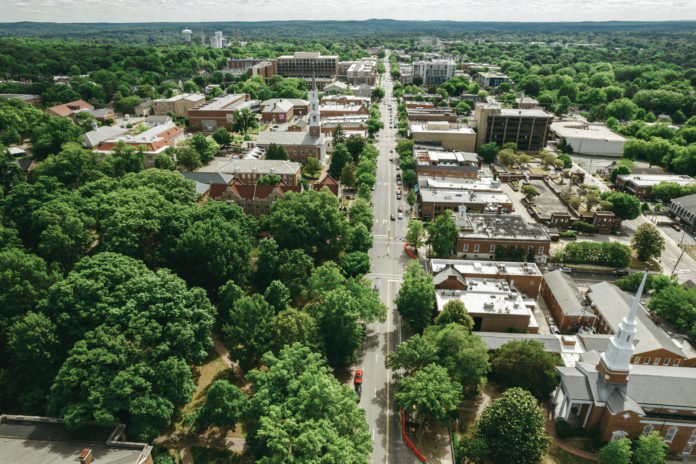The Issue that Just Won’t Go Away.
In the words of the late, great Yogi Berra, it is déjà vu all over again … during this year’s legislative session. Maybe not exactly, but NCLM and its members have been refighting some of the previous year’s battles over land-use planning policy that, to some degree, looked to have been put to rest.
As of this writing, it was not at all clear that any of these proposals would become law, and NCLM staff and members, by contacting their legislators individually and speaking at a committee hearing, had ensured that one of the most controversial bills would not be advancing in that form.
Still, legislative proposals that would limit local authority over zoning and land-use planning remain in vogue among at least some state lawmakers. Making the case against them has again involved showing—in bill after bill—how damaging the ideas could be to community character that helps drive economic activity and make cities and towns attractive to old and new residents alike.

Early in the legislative session, a Senate bill that would have eliminated single-family-only zoning across the state and put severe restrictions on conditional zoning caused a groundswell of opposition among municipal officials, with a number of cities passing resolutions against it. The legislation also sparked concerns from mixed-use developers, who see conditional zoning as useful in pursuing projects that often fail to conform to standardized zoning rules.
As municipal officials across the state made personal contact with legislators to explain the consequences, NCLM President and Salisbury Mayor Karen Alexander addressed a Senate committee, saying the legislation would “harm the character of local communities, damage the value of existing homes, undermine the rights of adjacent property owners, and prevent local officials from reaching consensus development decisions that balance the rights of everyone.”
The result was that the committee failed to take a vote on the bill. Although some minor changes in the legislation could ultimately move, the League’s efforts are believed to have stopped the primary, damaging provisions.
While key senators saw the prudence in holding back that bill, a new House committee began pushing through legislation that would restrict local land-use authority in a number of ways.
The House Committee on Local Government—Land Use, Planning, and Development first took up and approved a bill that would eliminate local tree ordinances, only allowing local governments to regulate tree removal and replanting requirements through local acts of the General Assembly. Other bills that would put some restrictions on conditional zoning, how cities regulate where schools can be built were also passed and provide for alternatives to local government inspection of commercial building also moved. In each case, except for the case of the inspections-
related legislation, the bills were approved by the House, though no action had been taken by the Senate as of this writing.
More controversial measures remained on the committee’s docket.
Meanwhile, legislation that could pose problems for local government regulation of short-term rentals, like AirBnB, also had made its way through the House.
As we reached the dog days of summer, and the legislative session looked as if it might drag on well into the fall, the fate of any of these measures in the Senate was far from clear. Nonetheless, Senate leaders have appeared more receptive to cities and towns regarding the long-term consequences of restrictive land-use measures. In recent years, more legislators in both chambers have recognized that city officials are typically responding to the demands of their constituents as they address growth and how to both encourage and manage it.
As Wake Forest Mayor Vivian Jones told the House Committee as it considered the tree ordinance bill: “I have been mayor of Wake Forest for 20 years, and the number one complaint that I receive is about trees being removed,” she said.
Still, the 2021 legislative session proves that these battles are not going away, as some developers push for cookie-cutter regulation from Raleigh so that they can pursue cookie-cutter development across the state.

That sentiment obviously does not account for how important community character, and the steps that local city and town councils and their planning staffs take to preserve and enhance it, are to communities being attractive places to live and conduct business in the first place.
For NCLM staff, it is those efforts—and how crucial they are to North Carolinians’ quality of life—that we will be emphasizing in more comprehensive ways to make the case for why local control of development and land-use must be preserved.
Did You Know?
- Zoning in U.S. cities in the early 20th century came at the behest of large-tract home developers concerned about nearby industrial uses harming the value of the property which they were developing.
- One of the first major court cases upholding the use of municipal zoning ordinances, Hadacheck v. Sebastian, involved whether the city of Los Angeles could prohibit brick-making operations in an area where residential developers were building homes.
- Multiple studies have shown that the location of city parks, open spaces and greenways are highly correlated to home values.
- A study asking retirees to rank the most important factors in their selection of a new location to live chose a top three of scenic beauty, recreational opportunity, and mild climate.
- Another study found that a community’s quality of life increased the attractiveness of a job, and the likelihood that an applicant would accept a job offer, by 33%.













